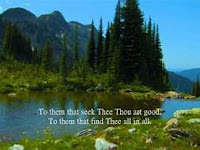"God is so good, He's so good to me!" A profound truth that is shared in a classic chorus sung all over the world.
It was many decades ago that the Greiner Family of Family Christian Inspiration shared this chorus with us in a series of meetings in our church. And since then we've sung it and used it in our ministry, both with children and adults. In Awana we used it when we went to prayer and also as a lead into our award time.
When I decided to share it in this blog I was surprised, not that I couldn't find the author, but that there were so many different claims of its authorship.
Some books claim that the song is an "African Melody" or that it was written by an anonymous person. Or they make no claim at all. Along the same line some attribute it to Paul Makaia, a leader in the Evangelical Church of Zambia since 1978 and the Dean of Students at Namibia Evangelical Theological Seminary in Windhoek, Namibia. He has wrote and composed numerous songs, most of which have been credited as "Anonymous" or "African Traditional." It could be him.
Other sources claim a Velna A. Ledin wrote it in 1933. They say she wrote it to help pass the time on a long road trip. She or her companions wrote the first verse and many others were added later. I guess that is possible.
But another source is Child Evangelism Fellowship. They claim that in 1961 a young Burundian diplomat knew that God was calling him to work with children. He and his wife and three children lived comfortably in Bujumbura, the capital city. After a serious accident that left Stephen Rutuna on his back in a hospital, unsure if he'd ever walk again, he finally submitted to God's call.
Shortly after making his commitment to the Lord, the king of Burundi told Stephen that he wanted him to serve as the Prime Minister. Stephen told the king that he would serve for one year to give the king time to find a replacement, but that God had called him to work with children, and he had to obey God. The king agreed to this arrangement. After serving a year, Stephen reminded the king of their agreement. The king told Stephen that he had two choices: Work for him or work for no one and be put to death. Stephen told the king that he had to obey God. As a result, Stephen was imprisoned.
Stephen was in a cell with others who were to be executed for various "crimes." The day arrived for the execution and one by one the men were removed from their cells and executed. By the time it was Stephen's turn, evening had set and the king decided to wait until the next morning to kill Stephen.
That evening, all alone in his cell, Stephen began to reflect upon his life. As he reflected on these things, he could only say, "God is so good, God is so good, God is so good, He's so good to me." God placed this simple song into Stephen's heart, and he sang it over and over that evening.
The next morning, the soldiers came to take Stephen to the place of execution. However, just as they got to the place where the execution would take place, a violent storm erupted, and lighting struck the ground very near where Stephen stood, knocking him unconscious.
When the soldiers came to their senses, they refused to kill Stephen. They told the king, "We cannot kill this man! His God has done this and He is more powerful. We are afraid to touch him!" The king agreed and set Stephen free. The king warned that if anyone helped Stephen, they would be put to death.
Stephen returned to his home to check on his family. When he arrived, he found his home had been burned to the ground. He sought out the CEF missionaries and found his family hiding in their home.
When the soldiers came to torch the missionaries' house and kill everyone, including Stephen's family, Stephen's youngest son had defiantly looked at the soldiers and exclaimed, "You can kill us, but God will remember." The soldiers were afraid and let the family go before torching the house.
For several months, the Rutuna family hid with the CEF missionaries until they were all able to escape to Uganda. They settled in Uganda and began the CEF work there. Later, under the reign of Idi Amin, the Rutuna's again had to flee for their lives. His son's need for surgery allowed the family to escape into Kenya where Stephen served with CEF, first as the National Director and later as the Regional Director for East and Central Africa.
Now I still don't know who actually wrote the chorus and it really doesn't matter. Over the years many additional verses have been added and sung in various places.
The truth is, God is so good as we've all experienced. He cares for us. He answers our prayers. And we should sing this chorus daily and praise His name.
1. God is so good,
God is so good,
God is so good,
He's so good to me!
2. God answers prayer,
God answers prayer,
God answers prayer,
He's so good to me!
3. He cares for me,
He cares for me,
He cares for me,
He's so good to me!
4. I love Him so,
I love Him so,
I love Him so,
He's so good to me!
5. I'll do His will,
I'll do His will,
I'll do His will,
He's so good to me!
6. I praise His name,
I praise His name,
I praise His name,
He's so good to me!
Listen to it being sung here. GOOD

















